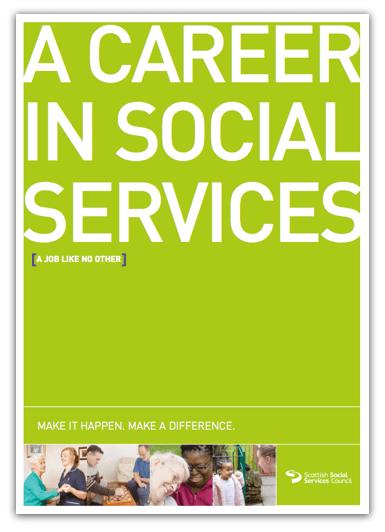
If you’re thinking about working with children go for it! You don’t know what you’re missing and what a difference you can make.
Anthony Docherty
Child Development Officer
Working with children and young people
In this career you could be inspiring children in their early years, supporting their development through childhood and helping them thrive as young adults. Good communication, creativity, resilience and an understanding of how children and young people think and feel will help you succeed.
What's it like?In early learning and childcare (including nurseries, crèches or childminding services) and out of school care you could provide care and educational experiences to children and help them to develop life skills.
There are also opportunities to support the social, emotional and educational wellbeing of both children and young people in other settings. This includes independent boarding schools, school hostels and residential special schools. In residential childcare you could provide this support to vulnerable children and young people who live in a care home, making sure they have the best opportunities to succeed in life.
Finally, you could also provide personalised support to children, young people and their families in their own homes.
As a social service worker you would adhere to a professional Code of Practice and commit to continuous learning which could include completing a qualification. This will help you develop in your career or even change direction. For example, some of your knowledge and skills will be transferrable to working with adults and older people.
If you’re thinking about working with children go for it! You don’t know what you’re missing and what a difference you can make.
Anthony Docherty
Child Development Officer

It can be so rewarding to support somebody to learn new skills or try new experiences. Equally I have learned a lot from the people I support.
John Duncanson
Senior Support Worker
Working with adults
In this career you can be a champion for the rights, strengths and diversity of adults and older people. You’ll need to be compassionate, committed, trustworthy and skilled. No two days will ever the same and you can make a real difference to people’s lives.
What's it like?Working with adults will give you opportunities to work across the community, for example in care homes, people's own homes and day care services. Often known as adult social care, this career involves close partnership work with the NHS and other agencies.
The most important partnerships will be with the people you support. They will need your help to achieve the things that matter most in their lives. These things will be unique to each person but could include staying healthy, safe and fulfilling dreams or ambitions. Supporting people in this way is extremely rewarding.
In this career you will need to be trustworthy and able to make good decisions in what are often challenging circumstances. Adhering to a professional Code of Practice and making a commitment to continuous professional learning will help you with this.
As you develop you will have opportunities to progress and even change direction. For example skills in adult social care are often transferrable to working with children and young people.
It can be so rewarding to support somebody to learn new skills or try new experiences. Equally I have learned a lot from the people I support.
John Duncanson
Senior Support Worker

Working with people is a real privilege. My social work qualification opened doors to a realm of real diversity.
Paula Brown
Social Worker
Social work
Social work is demanding but important and rewarding work which empowers people to take control of their lives and reach their potential. Social workers must be compassionate and understand the impact of social problems on the lives of people who are supported. They hold important duties, including safeguarding vulnerable people and protecting them from harm. This is why the values of human rights and social justice are central to social work practice.
What's it like?Social workers provide advice, support, care and protection to children and young people, families, adults and older people. They work together with people they support to help them make positive choices and live their lives independently. This could include people with physical and mental health issues, addictions or experience of exploitation.
They work in a diverse range of settings including local authorities, independent and voluntary agencies and in communities. In criminal justice settings, social workers play an important role in promoting community safety by supervising and supporting people with convictions.
Social work is a complex activity and social workers need to be resilient and able to respond to complex and changing situations. They apply a range of knowledge, skills and ethical practice to achieve positive outcomes.
Social worker is a protected title, which means you must hold a relevant social work qualification before entering practice. You must also adhere to a professional Code of Practice.
Working with people is a real privilege. My social work qualification opened doors to a realm of real diversity.
Paula Brown
Social Worker
Get started...
Explore the three qualification pathways to find out how you can develop your career.
Qualifications are compulsory for workers who need to register with the Scottish Social Services Council. To find out more visit www.sssc.uk.com/registration.
Working with children and young people
If you want to work with children and young people you can start your learning at school, apply for a college course or apprenticeship, or find a job and gain your qualification at work.
Quick Tip: Hover over the careers to see possible career paths. Bold text are primary paths, italic text are secondary paths. Click on the text to learn more about the qualification.
If you want to work with children and young people you can start your learning at school, apply for a college course or apprenticeship, or find a job and gain your qualification at work.
6
level
-
Foundation Apprenticeship Social Services (Children and Young People)
Foundation Apprenticeship Social Services (Children and Young People) at SCQF level 6
You can do Foundation Apprenticeships in fifth and sixth year of secondary school. They are delivered in partnership with a college over two years, often alongside Highers and National 5s.
You'll develop your knowledge and understanding of communication, health and safety, reflective practice and safeguarding children and young people. Your skills in these areas will be assessed in a work experience placement during the second year.
If you're a secondary school pupil interested in working with children and young people you should speak to your careers adviser to find out if your school offers this qualification.
Opportunities
This qualification will give you valuable work experience which could help you get your first job in social services, or help you improve your application to a college or university.
If you start work as a support worker in a day care of children service (for example in early learning and childcare or out of school care) you will need to register with the SSSC and achieve an accepted qualification. The recommended qualification is the SVQ Social Services (Children and Young People) at SCQF level 6. If you complete a Foundation Apprenticeship you will already have four units from the SVQ and will only need to complete two more.
If you don't feel ready to start work you could do a social service course at college to develop your knowledge and gain more work experience. Find out about social service courses at SQA Care.
Or you could apply for a social service Modern Apprenticeship and earn money while you learn. Find out more at www.apprenticeship.scot.
There are also opportunities to change direction if you would prefer to work with adults. Colleges and training centres can give you advice about this.
-
SVQ Social Services (Children and Young People)
SVQ Social Services (Children and Young People) at SCQF level 6
This is a work-based qualification designed for those who currently work in social services.
It meets the SSSC qualification requirement for:
- support worker in a day care of children service.
You don't need previous qualifications to apply for this SVQ however you will need to demonstrate that you are confident in your role and ready for assessment. Assessment would include reflective writing and direct observations of you at work. Completing an demonstrates your skills, knowledge and understanding in the key areas of communication, health and safety, reflective practice and safeguarding children and young people. Within the SVQ you'll be able to choose optional units relevant to your work, for example supporting children's learning through play or supporting children with additional support needs. Explore the units in our NOS Navigator.
There is no Modern Apprenticeship for this qualification however there is a Modern Apprenticeship in Social Services (Children and Young People) at SCQF level 7.
Opportunities
This qualification is suited to workers who enjoy delivering care and learning experiences for children, with support and supervision from more senior workers.
Practitioners in day care of children services, workers in residential childcare, school hostels and residential special schools, and school or house staff in independent boarding schools need qualifications at SCQF level 7. Find out more by clicking on the qualification titles at this level.
If you want to work with adults this qualification would give you credit towards the SVQ Social Services and Healthcare at SCQF level 6. You should speak with a training provider to find out more about this.
-
NC Early Education and Childcare
NC Early Education and Childcare at SCQF level 6
This qualification is delivered at college and is for people who are interested in providing care and early learning experiences to young children. You do not need to work in a social service role to apply for this qualification.
It meets the SSSC qualification requirement for:
- support worker in a day care of children service.
You will study child development and develop your awareness of the importance of play in early education. You will apply your knowledge and skills in work experience placements in an early learning and childcare setting such as a nursery or creche. Teaching methods could include lectures, online study and group work. This qualification can help you get your first job in social services and is also great preparation for further study, for example the HNC Childhood Practice at SCQF level 7.
If you are interested in this qualification you should get more information from the college you would like to attend as different entry requirements will apply. Colleges often have other introductory courses or access arrangements for people who don't meet the entry requirements.
Opportunities
This qualification is suited to workers who enjoy delivering care and learning experiences for children, with support and supervision from senior workers.
Practitioners in day care of children services, workers in residential childcare, school hostels and residential special schools, and school or house staff in independent boarding schools need qualifications at SCQF level 7. Find out more by clicking on the qualification titles at this level.
7
level
-
SVQ or Modern Apprenticeship Social Services (Children and Young People)
SVQ or Modern Apprenticeship Social Services (Children and Young People) at SCQF level 7
This is a work-based qualification designed for those who currently work in social services.
It meets the SSSC qualification requirement for:
- school or house staff in an independent boarding school
- practitioner in a day care of children service
- worker in residential childcare, a school hostel or a residential special school (these workers must also achieve an HNC Social Services or an award of 96 academic credits at SCQF level 7 or above).
Other workers may complete this qualification if suited to their role and responsibilities.
You don't need previous qualifications to start but the SVQ at SCQF level 6 is good preparation. Assessment includes reflective writing and direct observations of you at work. An SVQ demonstrates your skills, knowledge and understanding in the key areas of communication, health and safety, reflective practice and safeguarding children and young people. You'll get to choose optional units relevant to your work, for example working with families or supporting children and young people in residential care. Explore the units in our NOS Navigator.
There is a Modern Apprenticeship available in this qualification. Find out more about Modern Apprenticeships at www.apprenticeship.scot.
Opportunities
With this SVQ you can show that you are confident delivering a range of supports, often unsupervised and using your own initiative. You will be confident in complex tasks such as key working, where you would work closely with children and young people to identify positive outcomes and put plans in place to achieve them.
If you progress to a worker with supervisory responsibilities in residential childcare, a school hostel or a residential special school you will need to achieve the SVQ Social Services (Children and Young People) at SCQF level 9.
If you progress to lead practitioner or manager in a day care of children service you will need to achieve a childhood practice award at SCQF level 9 or above.
If you progress to a manager in residential childcare or an independent boarding school, school hostel or residential special school you will need to achieve the SVQ Social Services (Children and Young People) at SCQF level 9 plus an appropriate management qualification such as the SVQ Care Services Leadership and Management at SCQF level 10.
If you want to work with adults this qualification would give you credit towards the SVQ in Social Services and Healthcare at SCQF level 7. You should speak with a training provider to find out more about this.
-
HNC Childhood Practice
HNC Childhood Practice at SCQF level 7
Colleges deliver this qualification and there are sometimes opportunities to study part-time or by distance learning.
This HNC meets the SSSC qualification requirement for:
- support worker or practitioner in a day care of children service
- school or house staff in an independent boarding school.
You do not need to work in social services to apply, but you may need voluntary or paid work experience. You should research the college that you would like to attend as entry requirements will differ. You will likely need qualifications at SCQF level 6, for example SQA Highers or the NC Early Education and Childcare. Other criteria may be considered for individual applicants.
The HNC combines academic lectures and assignments with work experience. You will learn about care in modern society, leadership, health and wellbeing and human development. You will also learn about how to support children's learning through play and complete three SVQ units during your work placement.
Opportunities
The combination of academic study and workplace experience in this HNC will help you practise confidently in social services.
This HNC could help you to gain entry to a social work degree course. You should speak to individual universities to find out more, as entry requirements will differ.
If you progress to a lead practitioner or manager in a day care of children service you will need to achieve a childhood practice management award at SCQF level 9 or above.
If you progress to manager in an independent boarding school you will need to achieve the SVQ Social Services (Children and Young People) at SCQF level 9 plus an appropriate management qualification such as the SVQ Care Services Leadership and Management at SCQF level 10.
8
level
9
level
-
SVQ or Technical Apprenticeship Social Services (Children and Young People)
SVQ or Technical Apprenticeship Social Services (Children and Young People) at SCQF level 9
This is a work-based qualification designed for those who currently work in a leadership role in social services.
It meets the full SSSC qualification requirement for:
- supervisor in a residential childcare service.
It meets the SSSC practice qualification requirement for:
- manager of a residential childcare service, school hostel, residential special school or independent boarding school.
Managers must also achieve a management qualification, such as the SVQ Care Services Leadership and Management at SCQF level 10.
Other workers in children and young people settings can complete all or part of this qualification for continuous professional development if it is suited to their role and responsibilities.
You don't need previous qualifications to apply for this SVQ however you will need to demonstrate that you are confident in your leadership role and ready for assessment. Workers with qualifications at SCQF level 7 and 8 will be better prepared for completing a qualification at SCQF level 9. Assessment would include reflective writing and direct observations in the workplace. There is an emphasis on leading best practice and taking responsibility for the continuous professional development of yourself and others. Within the SVQ you'll be able to choose optional units relevant to your work, for example working with families or supporting young people through transitions and significant life events. Explore the units in our NOS Navigator.
There is a Technical Apprenticeship available in this qualification. A Technical Apprenticeship includes the full SVQ plus certificated career skills in areas such as business administration, management, enterprise and customer service. You should speak to your employer if you are interested in applying for an apprenticeship.
Opportunities
With this SVQ you can show that you are confident leading practice in a children and young people setting. There are a range of continuous professional development opportunities available which could include training programmes, personal study and qualifications designed to enhance your expertise in specific areas of practice.
If you want to work with adults this qualification would give you credit towards the SVQ in Social Services and Healthcare at SCQF level 9. You should speak with a training provider to learn more about this.
A social service qualification at SCQF level 9 is at the same level as a degree and could open up many other career opportunities. For example, with the right skills and experience you could start a career as a care inspector which would involve further specialist training. Or you could share your knowledge and skills in a learning and development role. There are a range of qualifications to support this including SQA awards for assessors available at SCQF levels 8 and 9, and social service practice learning qualification at SCQF level 9, 10 or 11.
-
Childhood Practice Award
Childhood Practice Award at SCQF level 9
Childhood practice award is a collective term for management qualifications based on the Standard for Childhood Practice (revised 2015). Workers in the following SSSC registration groups must achieve one of these awards:
- lead practitioner or manager in a day care of children service.
The award is available to other workers to support continuous professional development and career progression.
The focus of the award is on leadership, working with other professionals and supporting the development of workers so that the best outcomes are achieved for children. Childhood practice awards are delivered by colleges and universities, and completed through work-based learning. This could include directed reading, research, group work and direct observation of your practice.
To gain entry to a childhood practice award you must have a practice qualification suitable for working as a practitioner, for example the SVQ Social Services (Children and Young People) at SCQF level 7 or HNC Childhood Practice at SCQF level 7. You may be able to start a childhood practice award if you don’t have a practice qualification, but you must achieve it before you graduate.
Childhood practice awards are certificated at SCQF level 9 or above. Examples of qualifications offered by Scottish education providers which meet the standard include the BA degree (SCQF level 9, or SCQF level 10 with honours), Graduate Diploma (SCQF level 9), Professional Development Award (SCQF level 9, available as a Technical Apprenticeship), Post-graduate Diploma (SCQF level 11) and Master of Education (SCQF level 11). Providers offer different awards and you can choose one best suited to you. Whichever award you choose you must make sure it is accepted by the SSSC for registration.
Further guidance about these awards is available on the SSSC website.
Opportunities
A childhood practice award will help you as a lead practitioner or manager to lead best practice in the workplace so that children and young people are supported from the earliest stages to be successful learners who are capable of reaching their potential.
A social service qualification at level 9 or above could open up many other career opportunities. For example, with the right skills and experience you could start a career as a care inspector which would involve further specialist training. Or you could share your knowledge and skills in a learning and development role. There are a range of qualifications to support this including SQA awards for assessors available at SCQF levels 8 and 9, and social service practice learning qualification at SCQF level 9, 10 or 11.
10
level
-
SVQ or Professional Apprenticeship Care Services Leadership and Management
SVQ or Professional Apprenticeship Care Services Leadership and Management at SCQF level 10
This is a work-based qualification designed for those who manage care services.
It meets the SSSC management qualification requirement for:
- manager of an adult day care, care home, care at home or housing support service
- manager of a residential childcare service, school hostel, residential special school or independent boarding school.
Managers must also hold an accepted practice qualification, such as the SVQ Social Services and Healthcare at SCQF level 9 (adult services) or the SVQ Social Services (Children and Young People) at SCQF level 9 (children and young people services).
This SVQ focuses on the leadership and management elements of social services, for example
- promoting collaborative working
- managing and developing good practice
- developing, leading and managing care provision
- leading and managing health and safety
- managing strategy, policy and finances.
Explore the units in our NOS Navigator.
Opportunities
With this SVQ you can show that you are confident in developing, leading and managing a diverse range of care provision to adults, children or young people. You'll play a key role in developing and valuing workers so that they are able to deliver best practice. By leading and managing continuous improvement you'll also make sure that people who use services have access to the highest quality support which will enable them to achieve their personal outcomes.
There are a range of continuous professional development opportunities available which could include training programmes, personal study and qualifications designed to enhance your expertise in specific areas of practice.
11
level
Working with adults
If you want to work with adults you can start your learning at school, apply for a college course or apprenticeship, or find a job and gain your qualification at work.
If you want to work with adults you can start your learning at school, apply for a college course or apprenticeship, or find a job and gain your qualification at work.
6
level
-
Foundation Apprenticeship Social Services and Healthcare
Foundation Apprenticeship Social Services and Healthcare at SCQF level 6
You can do Foundation Apprenticeships in fifth and sixth year of secondary school. They are delivered in partnership with a college over two years, often alongside Highers and National 5s.
You'll develop your knowledge and understanding of communication, health and safety, reflective practice and safeguarding adults. Your skills in these areas will be assessed in a work experience placement during the second year.
If you're a secondary school pupil interested in working with adults you should speak to your careers adviser to find out if your school offers this qualification.
Opportunities
This qualification will give you valuable work experience which could help you get your first job in social services, or help you improve your application to a college or university.
If you start work as a support worker in a care home, housing support or care at home service you will need to register with the SSSC and achieve an accepted qualification. The recommended qualification is the SVQ Social Services and Healthcare at SCQF level 6. If you complete a Foundation Apprenticeship you will already have four units from the SVQ and will only need to complete two more.
If you don't feel ready to start work you could do a social service course at college to develop your knowledge and gain more work experience. Find out about social service courses at SQA Care.
Or you could apply for a social service Modern Apprenticeship and earn money while you learn. Find out more at www.apprenticeship.scot.
There are also opportunities to change direction if you would prefer to work with children and young people. Colleges and training centres can give you advice about this.
-
SVQ or Modern Apprenticeship Social Services and Healthcare
SVQ or Modern Apprenticeship Social Services and Healthcare at SCQF level 6
This is a work-based qualification designed for those who currently work in social services.
It meets the SSSC qualification requirement for:
- support worker in a care home service
- worker in a care at home or housing support service (both adult and children and young people settings).
You don't need previous qualifications to apply for this SVQ however you will need to demonstrate that you are confident in your role and ready for assessment. Assessment would include reflective writing and direct observations of you at work. Completing an demonstrates your skills, knowledge and understanding in the key areas of communication, health and safety, reflective practice and safeguarding adults. Within the SVQ you’ll be able to choose optional units relevant to your work, for example working with people with dementia or people with complex physical health needs. Explore the units in our NOS Navigator.
There is a Modern Apprenticeship available in this qualification. Find out more about Modern Apprenticeships at www.apprenticeship.scot.
Opportunities
This qualification is suited to those who enjoy providing direct support to people, with supervision and support from senior workers.
You may progress to roles which require further qualifications for example practitioner in a care home or a supervisor in any type of adult service. In these roles you need qualifications starting at SCQF level 7. Find out more by clicking on the qualifications at this level.
If you want to work with children and young people this qualification would give you credit towards the SVQ in Social Services (Children and Young People) at SCQF level 6. You should speak with a training provider to find out more about this.
7
level
-
SVQ or Modern Apprenticeship Social Services and Healthcare
SVQ or Modern Apprenticeship Social Services and Healthcare at SCQF level 7
This is a work-based qualification designed for those who currently work in social services.
It meets the SSSC qualification requirement for:
- practitioner in a care home.
It meets the SSSC practice qualification requirement for (a supervisory award is also required):
- supervisor in a care home
- supervisor in a care at home or housing support service (both adult and children and young people settings).
Other workers may complete this qualification if suited to their role and responsibilities.
You don't need previous qualifications to start, however the SVQ at SCQF level 6 is good preparation. Assessment includes reflective writing and direct observations of you at work. You'll demonstrate your skills, knowledge and understanding in the key areas of communication, health and safety, reflective practice and safeguarding adults. You'll get to choose optional units relevant to your work, for example working with people with convictions. Explore the units in our NOS Navigator.
There is a Modern Apprenticeship available in this qualification. Find out more about Modern Apprenticeships at www.apprenticeship.scot.
Opportunities
With this SVQ you can show that you are confident delivering a range of supports, often unsupervised and using your own initiative. You will be confident in complex tasks such as key working, where you would work closely with people who use services to identify their personal outcomes and plan their support.
If you are passionate about developing your leadership capability and supporting other workers you could progress to supervisor or manager, which will require additional qualifications described in this pathway.
If you want to work with children and young people this qualification would give you credit towards the SVQ in Social Services (Children and Young People) at SCQF level 7. You should speak with a training provider to find out more about this.
-
HNC Social Services
HNC Social Services at SCQF level 7
Colleges deliver this qualification and there are sometimes opportunities to study part-time or by distance learning.
This HNC meets the SSSC qualification requirement for:
- support worker or practitioner in a care home service
- worker in a care at home or housing support service (both adult and children and young people settings).
Workers in residential childcare, schools hostels and residential special schools can use it to meet their extra qualification requirement of 96 academic credits at SCQF level 7.
You do not need to work in social services to apply, but you may need voluntary or paid work experience. You should research the college that you would like to attend as entry requirements will differ. You will likely need qualifications at SCQF level 6, for example SQA Highers, however other criteria may be considered for individual applicants.
The HNC combines academic lectures and assignments with work experience. You will learn about care in modern society, leadership, health and wellbeing and human development. You will also complete three SVQ units during your work placement.
Opportunities
The combination of academic study and workplace experience in this HNC will help you practise confidently in social services.
This HNC could help you to gain entry to a social work degree course. You should speak to individual universities to find out more, as entry requirements will differ.
If you progress to a supervisor in any adult care setting you will need to achieve an additional award based on supervision or management theory, for example the PDA in Health and Social Care Supervision at SCQF level 7.
If you progress to manager you will need to achieve the SVQ Social Services and Healthcare at SCQF level 9 plus an appropriate management qualification such as the SVQ Care Services Leadership and Management at SCQF level 10.
-
Professional Development Award Health and Social Care Supervision
Professional Development Award Health and Social Care Supervision at SCQF level 7
This is an example of an award which has been designed to meet the requirements of workers who are registered with the SSSC as:
- supervisor in a care home
- supervisor in a care at home or housing support service (both adult and children and young people settings).
The SSSC requires that these supervisors gain an additional supervisory or management award in addition to their practice qualification (for example in addition to their SVQ). This additional award must contain supervision or management theory and practice suitable for a supervisor of a care service and have a minimum of 15 credits at SCQF level 7 or above.
The SSSC accepts other awards for this requirement if they meet the right criteria. Social service workers, in collaboration with their employers, can choose the award that best meets their role and learning style.
Supervisors in residential childcare, school hostels and residential special schools will instead require the SVQ Social Services (Children and Young People) at SCQF level 9 to fulfil their practice and supervisory qualification requirement.
Opportunities
As a supervisor you'll have recognisable leadership skills, and the ability to provide supervision, support and guidance to other workers.
Your employer could support your progression to manager. To do this you will need to work towards the SVQ Social Services and Healthcare at SCQF level 9 or SVQ Social Services (Children and Young People) depending on which type of service you work in. You will also need an appropriate management qualification such as the SVQ Care Services Leadership and Management at SCQF level 10.
You could support other workers to gain their qualifications by training as an SVQ assessor. To become an assessor you need to complete an SQA assessor's award, available at SCQF level 8 or 9.
8
level
9
level
-
SVQ or Technical Apprenticeship Social Services and Healthcare
SVQ or Technical Apprenticeship Social Services and Healthcare at SCQF level 9
This is a work-based qualification designed for those who currently work in a leadership role in social services.
It meets the SSSC practice qualification requirement for:
- manager of an adult day care or care home service
- manager of a care at home or housing support service (both adult and children and young people settings).
The workers above must also achieve a management qualification, such as the SVQ Care Services Leadership and Management at SCQF level 10.
Other workers in adult social care settings can complete all or part of this qualification as continuous professional development if it is suited to their role and responsibilities.
You don't need previous qualifications to apply for this SVQ however you will need to demonstrate that you are confident in your leadership role and ready for assessment. Workers with qualifications at SCQF level 7 and 8 will be better prepared for completing a qualification at SCQF level 9. Assessment would include reflective writing and direct observations in the workplace. There is an emphasis on leading best practice and taking responsibility for the continuous professional development of yourself and others. Within the SVQ you'll be able to choose optional units relevant to your work, for example first line management or working with substance misuse. Explore the units in our NOS Navigator.
There is a Technical Apprenticeship available in this qualification. A Technical Apprenticeship includes the full SVQ plus certificated career skills in areas such as business administration, management, enterprise and customer service. You should speak to your employer if you are interested in applying for an apprenticeship.
Opportunities
With this SVQ you can show that you are confident leading practice in an adult social care setting. There are a range of continuous professional development opportunities available which could include training programmes, personal study and qualifications designed to enhance your expertise in specific areas of practice.
If you want to work with children and young people this qualification would give you credit towards the SVQ in Social Services (Children and Young People) at SCQF level 9. You should speak with a training provider to learn more about this.
A social service qualification at SCQF level 9 is at the same level as a degree and could open up many other career opportunities. For example, with the right skills and experience you could start a career as a care inspector which would involve further specialist training. Or you could share your knowledge and skills in a learning and development role. There are a range of qualifications to support this including SQA awards for assessors available at SCQF levels 8 and 9, and social service practice learning qualification at SCQF level 9, 10 or 11.
10
level
-
SVQ or Professional Apprenticeship Care Services Leadership and Management
SVQ or Professional Apprenticeship Care Services Leadership and Management at SCQF level 10
This is a work-based qualification designed for those who manage care services.
It meets the SSSC management qualification requirement for:
- manager of an adult day care, care home, care at home or housing support service
- manager of a residential childcare service, school hostel, residential special school or independent boarding school.
Managers must also hold an accepted practice qualification, such as the SVQ Social Services and Healthcare at SCQF level 9 (adult services) or the SVQ Social Services (Children and Young People) at SCQF level 9 (children and young people services).
This SVQ focuses on the leadership and management elements of social services, for example
- promoting collaborative working
- managing and developing good practice
- developing, leading and managing care provision
- leading and managing health and safety
- managing strategy, policy and finances
Explore the units in our NOS Navigator.
Opportunities
With this SVQ you can show that you are confident in developing, leading and managing a diverse range of care provision to adults, children or young people. You'll play a key role in developing and valuing workers so that they are able to deliver best practice. By leading and managing continuous improvement you’ll also make sure that people who use services have access to the highest quality support which will enable them to achieve their personal outcomes.
There are a range of continuous professional development opportunities available which could include training programmes, personal study and qualifications designed to enhance your expertise in specific areas of practice.
11
level

Continuous professional learning
As well as completing qualifications, social service workers need to maintain and develop their knowledge, skills and values throughout their career. Social service employers must support this.
The SSSC Learning Zone can help you develop your knowledge about SVQs, leadership, dementia, childhood practice and more.
To see where else your career might take you, try exploring the qualifications at SQA Care or click on the specialist awards below.
Interested in a career? Our resources will help you prepare


Codes of Practice for Social Service Workers and Employers
If you’re thinking about applying for a job it’s important you know about the professional code of practice.
Download the codes

A Career in Social Services [a job like no other]
Get more information and practical advice from our careers booklet.
Download booklet
A Question Of Care
Remember, you don't usually need a qualification to start your career. Employers often hire people for their values and positive attitude.
Take our Question of Care challenge to see if you've got what it takes.
Take the challenge
Social work
Social worker is a protected title so you must achieve one of these qualifications before working in this role.